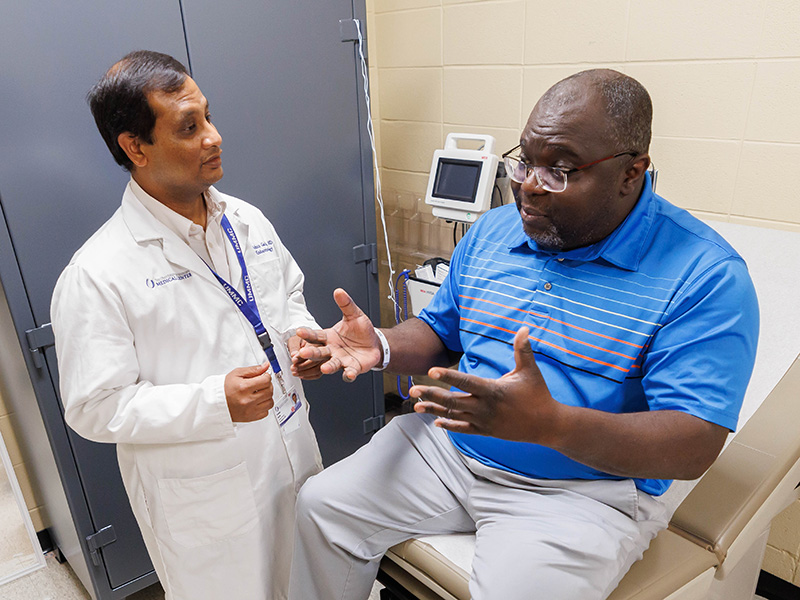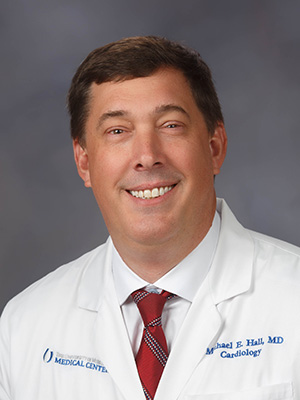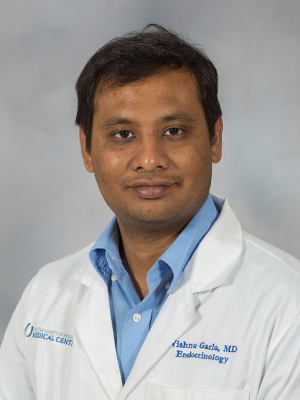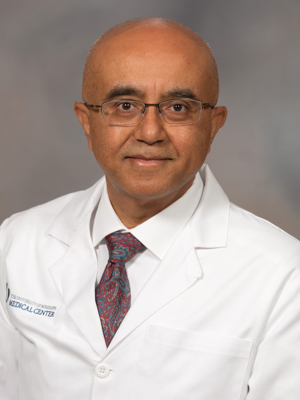FREEDOM: Researchers study impact of food delivery, coaching, telemonitoring on diabetes

Some adults with Type 2 diabetes least likely to have access to transportation, healthy foods and health care are participating in a $3.6 million study investigating the impact of those factors on improved health outcomes.
The University of Mississippi has partnered with the University of Alabama at Birmingham to develop the Food delivery, Remote monitoring and coaching-Enhanced Education for Optimized Diabetes Management study, better known as FREEDOM, which began enrolling existing UMMC patients in January.

Dr. Michael Hall, chair of the Department of Medicine, and Dr. Vishnu Garla, associate professor of medicine, are co-principal investigators of the UMMC arm of the study that is funded by the National Institute on Minority Health and Disparities.
“Access to timely care and access to healthy foods are major barriers to optimal health care for our population,” said Hall. “We are trying to eliminate some of these barriers to better treat people with diabetes. Mississippi has some of the highest rates of diabetes, as well as socioeconomic disparities in the country.”
The study targets Black patients with either kidney or vascular disease who are living with food insecurity, a group that is disproportionately high risk and underserved, making it of particular relevance in Mississippi, said Garla. Black patients have the highest rate of Type 2 diabetes.
About 14 percent of Mississippians have been diagnosed with diabetes, according to the American Diabetes Association. Another 75,000 have the disease but don’t know it.
Participants are randomized to receive one or a combination of health coaching, remote patient monitoring and bi-weekly delivery of groceries that meet ADA nutritional standards.
Investigators use a factorial clinical trial design to compare the interventions – both individual and as a combination – to standard of care.
Of the 304 patients participating in the study, 152 – half – will be enrolled at UMMC.
Romal Bell, 45, who has had a history of uncontrolled diabetes since being diagnosed in 2004, joined the trial because it “sounded like a unique opportunity to have some extra hands-on care.”
The Jackson resident, who is receiving all three interventions, said he has a lot on his plate, including
studying for the CPA exam, driving his aunt and uncle to their doctors’ appointments and teaching online.
“I have a lot to remember, and I’m always forgetting to check my glucose. But seeing that tablet in my living room reminds me, and I’ll do it.”
Bell is referring to the electronic tablet he uses to transmit his glucose levels four times a day to the remote patient monitoring team at UMMC, where doctors and nurses monitor his readings in real time.

The fact that the study addresses the medical, social and educational needs of participants makes it unique, said Garla.
“Mississippi has one of the highest rates of obesity, diabetes mellitus and cardiovascular disease,” said Garla. “And access to health care secondary to geographical factors and the relative lack of health care providers compounds the problem.
“This three-pronged approach utilizing a remote approach has the potential to be a game changer in the management of diabetes in underserved populations.”

Saurabh Chandra, chief telehealth officer, is excited to be supporting the remote patient monitoring component of the study.
“Such rigorous scientific inquiries are needed to demonstrate the value of telehealth-based interventions in managing multiple chronic diseases,” said Chandra. “We have an experienced clinical team that follows evidence-based guidelines and are ready to offer their expertise to this study.”
Maddie Chaney, primary research study coordinator, said the team is mostly recruiting patients from endocrinology and cardiology. “Potential study participants tend to be more receptive to hearing about the study if they are hearing about it for the first time from a trusted provider.”
Garla said investigators hope the study shows that the three interventions are effective in controlling diabetes and improving the quality of life of participants.
“We also hope these interventions will be a cost-effective solution to managing diabetes in high-risk and underserved populations.”
Bell is grateful for the food delivery, which helps him say no to fast foods, more plentiful in his neighborhood than fresh foods. But his favorite parts of the program are the remote monitoring and coaching.
“Maybe RPM is just a smidge more beneficial, especially because it’s being monitored on a daily basis. But the coaching is several times a week, and the coach really helps me stay on top of my small-term goals in a way that makes them achievable. She’s very organized, and it’s very structured – it reminds me of a lot of what I learned in business school.”
If you are a UMMC patient interested in participating in the FREEDOM trial, contact the study team at 601-815-8702 or mchaney@umc.edu. You may also check your eligibility here.


